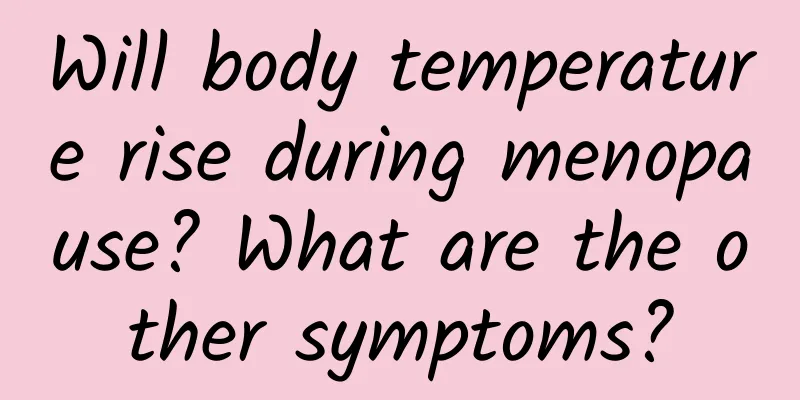Will body temperature rise during menopause? What are the other symptoms?

|
Menopause is a necessary process for women. Generally, the body temperature will not rise when entering menopause. The main symptoms are emotional instability, menstrual disorders, frequent sweating, and bone and joint problems. Therefore, if the body temperature is found to be significantly increased, it should be taken seriously, as it may be caused by cold or other factors. As a woman, menopause is a necessary process, which usually occurs between the ages of 45 and 55. During this period, the number of menstrual periods will gradually decrease, and later on, they will disappear. The function of the ovaries will also gradually decline. Therefore, menopause is a necessary transition stage. Will the body temperature rise during menopause? |
<<: How thick is the endometrium during menopause?
>>: What is the age range for menopause?
Recommend
3 common sense about ectopic pregnancy
Life begins with a tiny fertilized egg. Under nor...
What should women do if they have cervical erosion? Common knowledge on how to prevent cervical erosion in women
Cervical erosion is a common gynecological diseas...
How to regulate to reduce the degree of dysmenorrhea What are the methods of regulating dysmenorrhea
Dysmenorrhea is a common problem for many women d...
Common knowledge about Trichomonas vaginitis
What is Trichomonas vaginitis? How much do you kn...
The side dish jellyfish skin is made of jellyfish. Can it supplement collagen and help lose weight? Pay attention to these things!
Recently, a statement has been circulating on the...
What are the treatments for pelvic effusion?
Treatment of pelvic effusion with folk remedies W...
What is the reason for a lot of farts after miscarriage?
Abortion refers to artificial abortion, and exces...
Can uterine fibroids be cured?
Can uterine fibroids be cured? 1. Uterine fibroid...
What to do if you feel gas in your stomach after abortion? Do these 5 things
Some people always feel gas in their stomach afte...
How to cure vaginal candidal infection?
Vaginal candidiasis is a common gynecological dis...
Do you know that there are foods that you cannot eat during menstruation?
Women cannot eat cold food during menstruation. I...
What causes abnormal vaginal discharge in women? 4 reasons for abnormal vaginal discharge
What are the causes of abnormal vaginal discharge...
35 is a turning point! If you don’t want a bulging belly, do these 3 things to prevent “visceral prolapse”
"Please teach me the slimming exercises quic...
What are the symptoms of uterine fibroids?
The uterus is a fertile place that produces menst...
Can exercise treat cervical hypertrophy?
Cervical hypertrophy can be improved with the hel...









